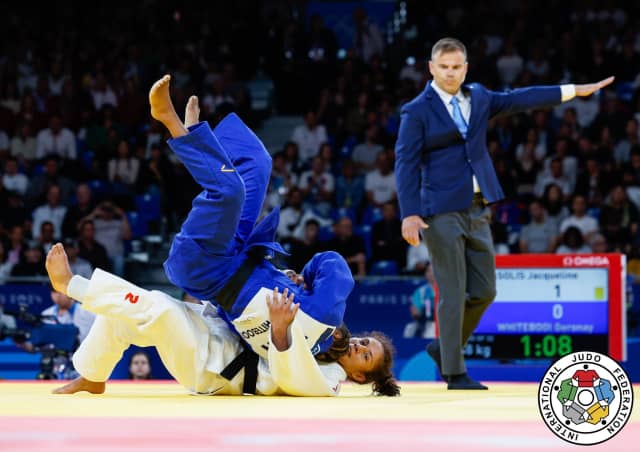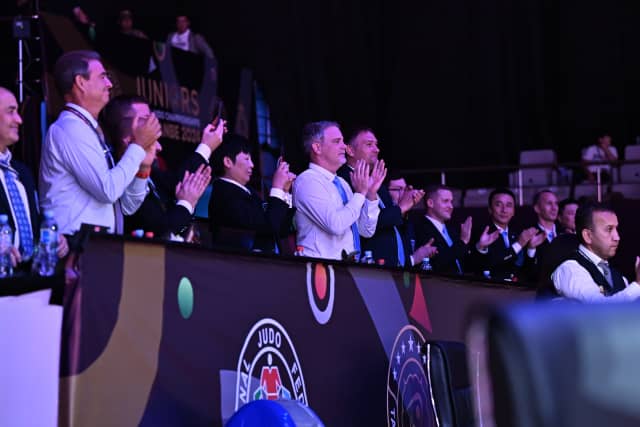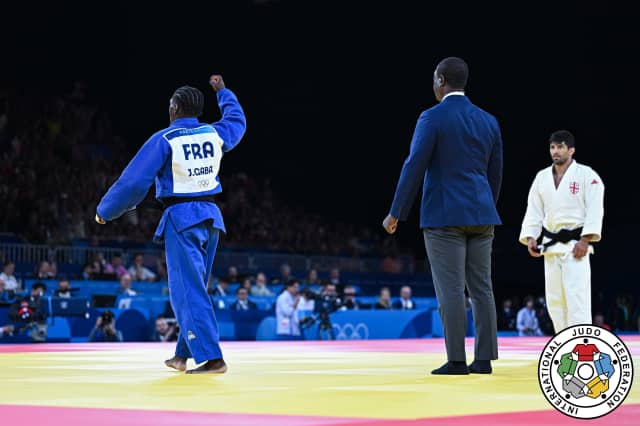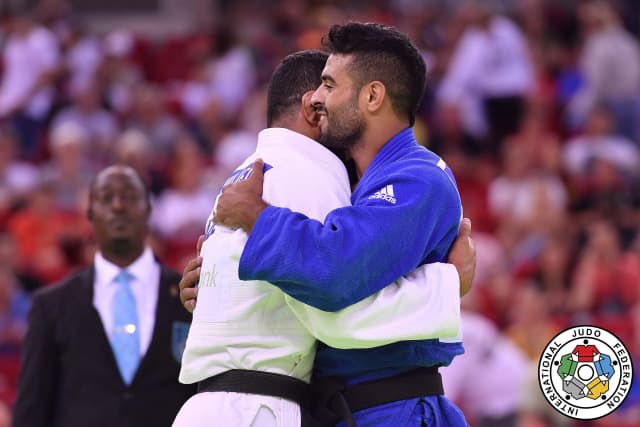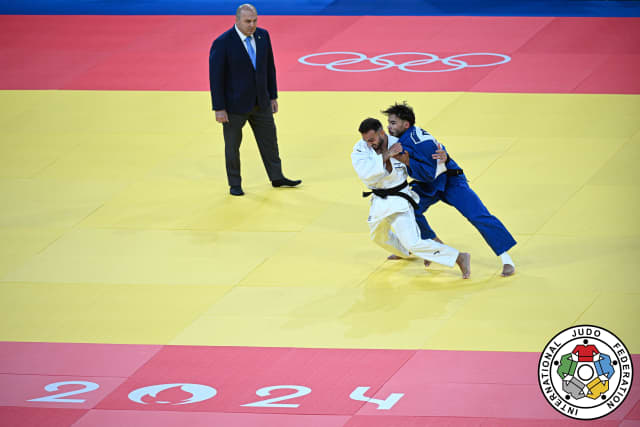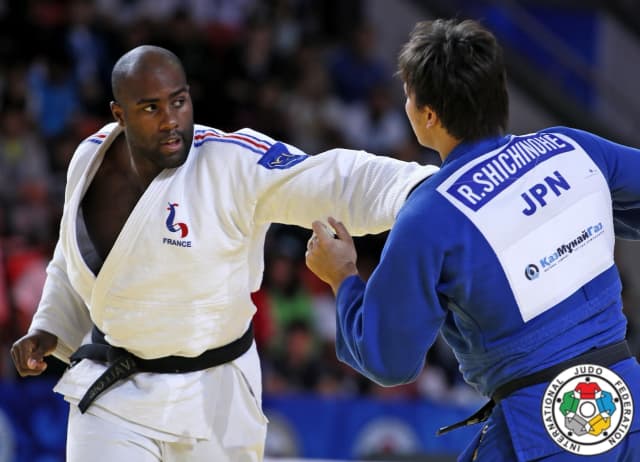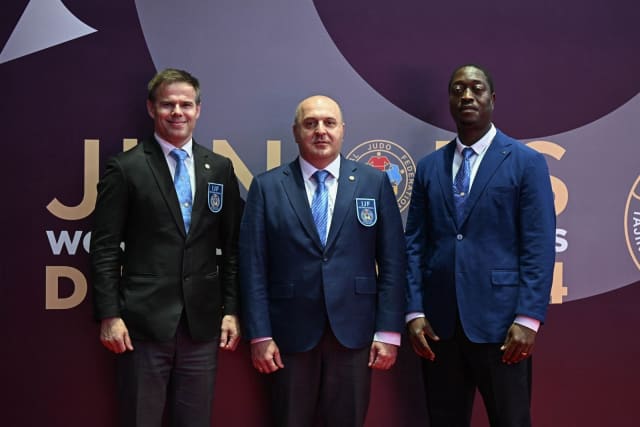Just as with the athletes of the World Judo Tour, the referees must go through many stages along the way. They begin at home, officiating at domestic events and gradually move into programmes in order to develop towards the international level. There are examinations, both practical and written. There are nerve-racking selections and invariably there are moments of realisation, acceptance of not quite making the grade. All those who made it to the Paris Games have found solutions and with their colleagues gathered around to support them, have made the necessary adjustments at each stage to earn the most prestigious selection of all.
Each stage though, comes to an end eventually. In Dushanbe, at the 2024 World Championships Juniors, 2 of the judo family’s Olympic referees took their positions in the centre of an IJF tatami for the last time. They received a standing ovation from their peers and from the entire IJF staff, accompanied by huge cheers from the spectators. A third Olympic referee was also present but in a new role, working as an IJF Referee Supervisor for the first time. As they move into new stages of their careers, they reflected a little on their careers so far. Veli-Matti Karinkanta, Vladimer Nutsubidze and Jean-Claude Djimbi spoke about what they have learned, what they have enjoyed and also what is next for them.
Veli-matti Karinkanta (FIN) refereed at the Tokyo and Paris Olympic Games and at 6 senior world championships. He was an IJF referee for more than 20 years and retired in Dushanbe.
“I have learned a lot from these years of refereeing on the World Judo Tour. From the beginning I learned to be very critical of myself and later to forgive myself too. I’m so critical and analytical and sometimes it has been a lot, too much, so finding the balance has been very important for me. It was important also not to be too satisfied with my work so as to keep the development moving forward; perhaps this has been the most important part of getting better.
The aspect I have enjoyed most is the friendship with colleagues, to know them all and work with them, to make good memories with them. I enjoyed all the high level contests I have had the opportunity to referee. Perhaps the Paris Olympic Games mixed teams contest between Teddy Riner and Tatsuru Saito was the most important fight in my career, the 3rd fight in the mixed team final. I got it right and it was a nice fight. It was an honour."
"For the next couple of months I will be staying at home in Finland working at local events and coaching in my club. I will stay at home with my wife for a while, which hasn’t happened often in recent years. Then I will think about what I can do to help the younger referees to achieve their goals. I need some time to reflect before a decision is made but I will undoubtedly continue in the area of referee education.”
Jean-Claude Djimbi (GAB) refereed at the Tokyo and Paris Olympic Games and at 7 senior world championships.
“Learning to analyse myself has been a very important thing. As one of very few African referees coming to the IJF, I know there are a lot of eyes on me. I have to be correct and so checking in with myself repeatedly has been the way forward. I always talk with colleagues and try to learn from them. I feel it helped me to improve my level to have an analytical but also group orientated approach. My colleagues have been so important throughout.
I have enjoyed so much. It is an honour being part of judo’s history. For example, I refereed Saeid Mollaei and Sagi Muki’s first fight together. In the media, it was covered a lot and I felt good to be part of such a positive moment. Also, in Africa I make history for both my continent and my country. Being an example for African judoka, showing them that big things are possible, this is enjoyable in a whole different way."
"From a specific perspective, I really enjoyed refereeing the Riner vs Sasson contest at the Tokyo Olympic Games. I know that alongside my personal enjoyment, African judoka are proud to see me on the mat with such superstars of judo. I also have to mention my participation at a junior European championships as a referee from Africa, the first one ever to referee at a Europeans.” Continental championships are almost always refereed by referees from that continental union.
It is a challenge for the referees to pinpoint just one or two moments of significance from such long careers. Almost ready to move on to thinking about his next chapter, Jean-Claude Djimbi stopped and said, “There is also the Teddy contest in Paris at the Olympic mixed teams event. In France’s first match, in the round of 16, against Israel, I refereed his contest against Peter Paltchik, Teddy’s first contest since becoming the most decorated Olympic judoka in history, just a day after he won his 3rd individual Olympic title.” There are a lot of wonderful memories to wade through.
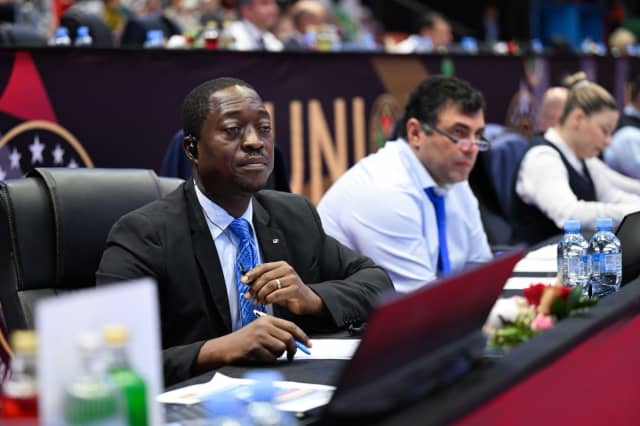
“Next, well my next step is already clear as I was invited to take up a new role with the team of IJF supervisors. It could be said that this is a normal step but I am happy to be in this position. Judo is a big family with great friendships and I am happy that my colleagues are happy for me. They have always celebrated my career with me. This junior worlds was my first event in this new phase and I was working with the best referees. My colleagues, who are also my peers, have taken my comments so positively and have agreed. This new job is not easy and I have to find new strategies to level up step by step but the refereeing team are helping and supporting me. Jita kyoei!”
Vladimer Nutsubidze (GEO) has refereed at 3 Olympic Games: Rio, Tokyo and Paris. He has also officiated at 10 senior world championships. He was an IJF referee for more than 25 years and retired in Dushanbe.
“I learned the self-control needed to not show my emotions at the wrong moment, to be calm and quiet in challenging situations. We are on TV and judo fans see our faces very close up. Our movement and expressions can give away more than we want. This self-control has been a good lesson for all of my life, even outside judo.
I have learned about different cultures and traditions through travelling to so many different countries. In each new place I try to learn something important from my local colleagues. It’s not just about saying ‘hajime’ on the mat but how we can employ what we do in our broader lives and that means being awake and aware of where we are and what we do."
"I have enjoyed many fights, so many which could have been labelled as ‘fight of the year.’ My favourite was between the two Japanese judoka Joshiro Maruyama and Hifumi Abe at the Doha World Championships 2023, a fight to decide who would go to the Games. It was not a typical Japanese contest. They didn’t fight for a place, for a medal, but for their lives."
"I also remember when Teddy Riner was fighting in Paris in 2013 and I was in just the right place to see an elbow which excluded the score. The spectators thought Shichinohe (JPN) scored and they all shouted. Japanese TV called for interviews for why I didn’t score it but in the end it was shown that I was correct. I was able hold my line and in interviews say it exactly as I saw it, just because I stood in the right place at the right time."
"Next? I will stay in judo, without a doubt. Now I need some rest as I passed my continental licence in 1999 and have not stopped travelling since; I really don’t know how many countries I have visited. It’s time for a break. It’s important to think about what I have now because I think my life happened through judo. People outside venues ask for photos. In Georgia I am well known and people there stop me in the street to say hello and take selfies. This kind of fun is all thanks to judo. I have a long and high level academic life but everyone knows me from judo and not from my other professional life. It’s quite strange to be known for exactly half of who I am but I am happy that judo has given my life such variation and fun.
The next position isn’t decided yet. Refereeing has provided me with some of the best memories and moments and I must take time to think and reflect and really enjoy them before I move on but I am not going far from judo, nor for very long.”
Taking time to reflect is a universal theme and an important one. While Veli-matti, Jean-Claude and Vladimer do that, it is time for us to thank them for their service.

